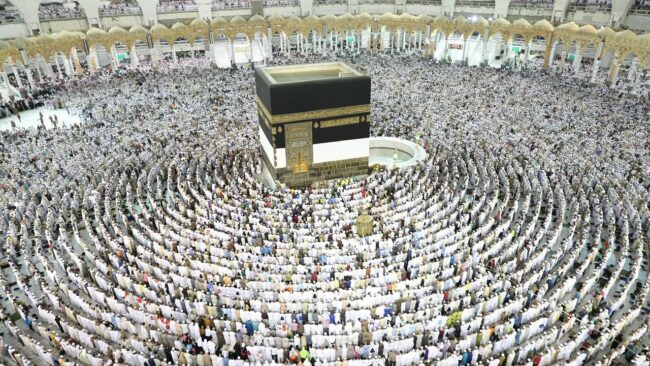![]()
Expert advises on precautions to against heat exhaustion, to ensure safe pilgrimage experience in Saudi Arabia
By Nisha Rahim

As the Hajj season approaches with the pilgrimage set to take place in Saudi Arabia from 26 June to 1 July, organisations are advised to take precautions to ensure the safety and well-being of those going on their pilgrimage.
Hajj is a Islamic pilgrimage that takes place in Saudi Arabia, where millions of participants gather to perform specific rituals, aiming to fulfil one of the five pillars of Islam.

With an anticipated two million participants expected to descend onto the holy city of Mecca, it is crucial to navigate the extreme heat and humidity that come with the summer season in Saudi Arabia.
Medical and security services company International SOS has put up guidelines on Wednesday (21 June) to help pilgrims stay safe during this challenging period.
Dr Marie Louise Van-Eck, regional medical director at International SOS in Dubai, emphasises the importance of understanding the risks associated with extreme heat.
She states, “Our bodies are naturally designed to maintain a constant temperature of around 37°C. The body automatically balances heat gain and loss; however, if it is unable to effectively cool down, the inner ‘core’ temperature can rise to dangerous levels. This leads to the breakdown of bodily systems. Anyone can be overcome by heat, even people who are fit and healthy.”
Dr Van-Eck also highlights that certain individuals, such as young children, pregnant/nursing mothers, the elderly, and those with medical conditions, are at higher risk and should be closely monitored.
Ensuring safety and well-being during Hajj
To combat the challenges of extreme heat during the Hajj season, International SOS recommends several precautions.
Pilgrims are encouraged to listen to their bodies, avoid over-exertion, comply with all health regulations, and practice good hygiene to prevent spreading diseases like the Middle East Respiratory Syndrome coronavirus (MERS-CoV).
Here are some tips from International SOS for organisations to ensure the health and safety of pilgrims during the hot season:
1. Stay hydrated to avoid heatstroke
Select safer food and beverages such as bottled water, thoroughly washing fruits and vegetables, ensuring thorough cooking of meat, and avoiding non-pasteurised dairy items.
2. Dress appropriately in loose, lightweight clothing made of natural fibres like cotton or linen
Light-coloured clothes that reflect heat and the use of wide-brimmed hats or umbrellas for sun protection are recommended.
3. Rest and take frequent breaks in cool places.
Protect the skin by applying sunscreen and following the manufacturer’s instructions. Cool showers, baths, or sponging off with cool water can help lower body temperature, while cool water sprays and fans can create a breeze and relieve the heat.
4. Raise awareness about high-risk groups and encourage extra precautions, and monitor their well-being
Comply with instructions provided by Hajj operators if involved in conducting the pilgrimage and be mindful of set times organised by Saudi Arabian authorities to minimise overcrowding.
5. Pay attention to personal hygiene,
Maintain distance from sick individuals, wash hands frequently, and avoid touching the face.
6. Avoid direct contact with animals,
Including camels, due to the potential presence of MERS-CoV.
7. Save emergency contacts on mobile phones and ensure they are charged
Don’t forget to include important contacts such as police, ambulance services, embassy, and local contacts.
8. Stress the need for heightened caution
Respect local legal, religious, and cultural sensitivities at all times, especially on social media platforms.
9. Anticipate tighter security and increased traffic
Prepare for possible congestion at transport hubs, and increased demand for services during the pilgrimage.
*Credit:Yahoo Lifestyle





